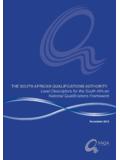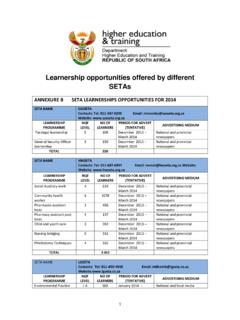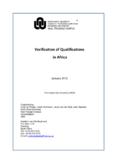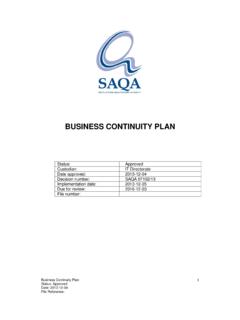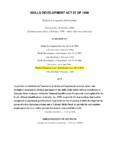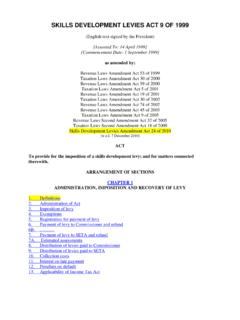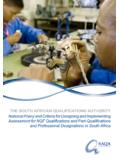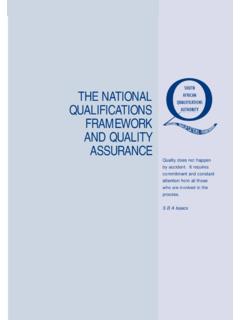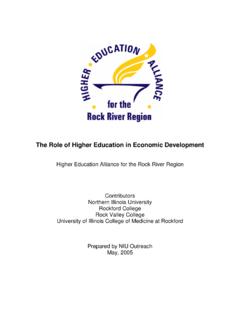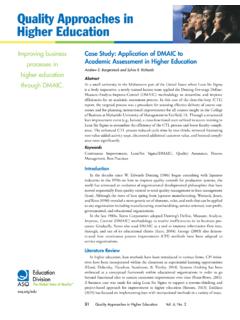Transcription of HIGHER EDUCATION ACT - South African Qualifications …
1 HIGHER EDUCATION ACT 101 OF 1997 (English text signed by the President) [Assented To: 26 November 1997] [Commencement Date: 19 December 1997] as amended by: HIGHER EDUCATION Amendment Act 55 of 1999 HIGHER EDUCATION Amendment Act 54 of 2000 HIGHER EDUCATION Amendment Act 23 of 2001 HIGHER EDUCATION Amendment Act 63 of 2002 HIGHER EDUCATION Amendment Act 38 of 2003 HIGHER EDUCATION Amendment Act 39 of 2008 HIGHER EDUCATION Laws Amendment Act 26 of 2010 [with effect from 7 December 2010] ACT To regulate HIGHER EDUCATION ; to provide for the establishment, composition and functions of a Council on HIGHER EDUCATION ; to provide for the establishment, governance and funding of public HIGHER EDUCATION institutions; to provide for the appointment and functions of an independent assessor; to provide for the registration of private HIGHER EDUCATION institutions; to provide for quality assurance and quality promotion in HIGHER EDUCATION ; to provide for transitional arrangements and the repeal of certain laws; and to provide for matters connected therewith.
2 Preamble. WHEREAS IT IS DESIRABLE TO - ESTABLISH a single co-ordinated HIGHER EDUCATION system which promotes co-operative governance and provides for programme-based HIGHER EDUCATION ; RESTRUCTURE AND TRANSFORM programmes and institutions to respond better to the human resource, economic and development needs of the Republic; REDRESS past discrimination and ensure representivity and equal access; PROVIDE optimal opportunities for learning and the creation of knowledge; PROMOTE the values which underlie an open and democratic society based on human dignity, equality and freedom; RESPECT freedom of religion, belief and opinion; RESPECT and encourage democracy, academic freedom, freedom of speech and expression, creativity, scholarship and research; PURSUE excellence, promote the full realisation of the potential of every student and employee, tolerance of ideas and appreciation of diversity; RESPOND to the needs of the Republic and of the communities served by the institutions; CONTRIBUTE to the advancement of all forms of knowledge and scholarship, in keeping with international standards of academic quality; AND WHEREAS IT IS DESIRABLE for HIGHER EDUCATION institutions to enjoy freedom and autonomy in their relationship with the State within the context of public accountability and the national need for advanced skills and scientific knowledge.
3 ARRANGEMENT OF SECTIONS CHAPTER IDEFINITIONS, APPLICATION AND DETERMINATION OF POLICY 1. Definitions 2. Application 3. Determination of HIGHER EDUCATION policy CHAPTER 2 COUNCIL ON HIGHER EDUCATION 4. Establishment of Council on HIGHER EDUCATION (CHE) 5. Functions of CHE6. Information to be provided to CHE 7. Qualifications , quality promotion and quality assurance 8. Composition of CHE9. Term of office of members 10. Vacation of office by members 11. Filling of vacancies 12. Executive officer and employees of CHE 13. Executive committee of CHE 14. Committees of CHE 15. Meetings of CHE and committees 16. Funds of CHE 17.
4 Remuneration and allowances of members of CHE and committees 18. Annual audit 19. Annual report CHAPTER 3 PUBLIC HIGHER EDUCATION INSTITUTIONS 20. Establishment of public HIGHER EDUCATION institutions 21. Declaration of EDUCATION institutions as public HIGHER EDUCATION institutions 22. Consequences of declaration as public HIGHER EDUCATION institutions 23. Merger of public HIGHER EDUCATION institutions 24. Incorporation of subdivisions of public HIGHER EDUCATION institutions 25. Closure of public HIGHER EDUCATION institutions CHAPTER 4 GOVERNANCE OF PUBLIC HIGHER EDUCATION INSTITUTIONS 26. Institutional governance structures 27. Council of public HIGHER EDUCATION institution 28.
5 Senate of public HIGHER EDUCATION institution 29. Committees of council and senate 30. Principal of public HIGHER EDUCATION institution 31. Institutional forum 32. Institutional statutes and institutional rules 33. Institutional statutes to be approved or made by Minister 34. Appointment and conditions of service of employees of public HIGHER EDUCATION institutions 35. Students representative council 36. Disciplinary measures 37. Admission to public HIGHER EDUCATION institutions 38. Cooperation between public HIGHER EDUCATION institutions 38A. Establishment of national institute for HIGHER education38B. Functions of national institute for HIGHER education38C. Composition of board38D.
6 Term of office of chairperson and members38E. Vacation of office38F. Filling of vacancies38G. Funds of national institute for HIGHER education38H. Annual audit38I. Annual report CHAPTER 5 FUNDING OF PUBLIC HIGHER EDUCATION 39. Allocation of funds by Minister 40. Funds of public HIGHER EDUCATION institutions 41. Records to be kept and information to be furnished by council 41A. Appointment of administrator 42. Action on failure of council to comply with this Act or certain conditions CHAPTER 6 INDEPENDENT ASSESSOR 43. Appointment of independent assessment panel 44. Appointment of independent assessor 45. Cases where independent assessor may be appointed 46. Independent assessor may be appointed for two or more public HIGHER EDUCATION institutions47.
7 Functions of independent assessor 48. Assistance to independent assessor 49. Remuneration and allowances CHAPTER 7 PRIVATE HIGHER EDUCATION INSTITUTIONS 50. Designation of registrar 51. Registration of private HIGHER EDUCATION institutions 52. Application for registration 53. Requirements for registration 54. Determination of application for registration 55. Certificate of registration 56. Access to information 57. Records and audits 58. Amendment of registration 59. Requirements for amendment of registration and determination of application 60. Conditions for registration 61. Amendment or cancellation of conditions 62. Cancellation of registration 63.
8 Steps before amendment or cancellation 64. Appeal to Minister CHAPTER 8 GENERAL 65. Name change of public HIGHER EDUCATION institution 65A. Seat of public HIGHER EDUCATION institution65B. Degrees, diplomas and certificates65C. Honorary degrees65D. Qualifications registered on National Qualifications Framework66. Offences 67. Limitation of liability 68. Delegation of powers 69. Regulations 70. Application of Act when in conflict with other laws CHAPTER 9 TRANSITIONAL AND OTHER ARRANGEMENTS 71. Existing statutes and rules of public HIGHER EDUCATION institutions 72. Existing technikons and universities 73. Abolition of University and Technikons Advisory Council 74.
9 Abolition of statutory status of Committee of University Principals, Matriculation Board and Committee of Technikon Principals 75. Exemption of existing private HIGHER EDUCATION institutions 76. Repeal of laws 77. Short title CHAPTER 1 DEFINITIONS, APPLICATION AND DETERMINATION OF POLICY 1. Definitions In this Act, unless the context otherwise indicates - academic employee means any person appointed to teach or to do research at a public HIGHER EDUCATION institution and any other employee designated as such by the council of that institution; applicant means any person who makes any application referred to in Chapter 7; auditor means any person registered as such in terms of the Public Accountants and Auditors Act, 1991 (Act No.)
10 80 of 1991); CHE means the Council on HIGHER EDUCATION established by section 4; college means any college established or declared as a college under this Act; council means the governing body of a public HIGHER EDUCATION institution; Department of EDUCATION means the Department of HIGHER EDUCATION and Training; [Definition of Department of EDUCATION substituted by s. 1 of Act 26/2010] Director-General means the Director-General of the Department of HIGHER EDUCATION and Training; [Definition of Director-General substituted by s. 1 of Act 26/2010] employee means any person employed at a public HIGHER EDUCATION institution; employer means the council of a public HIGHER EDUCATION institution; financial year means a year commencing on the first day of April and ending on the thirty-first day of March of the following year; foreign juristic person means a person - (i) registered or established as a juristic person in terms of a law of a foreign country; and (ii) recognised or registered as an external company in terms of the Companies Act, 1973 (Act No.

